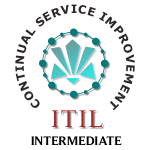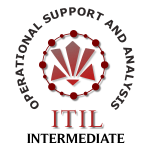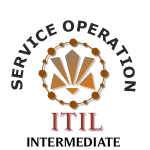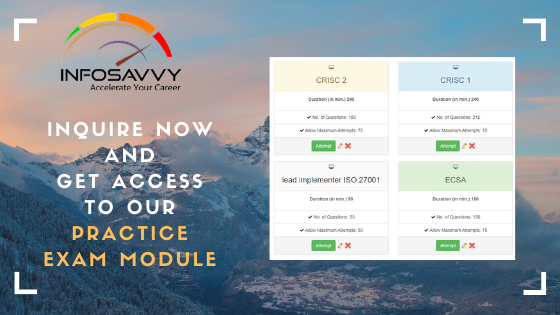The ITIL Intermediate Qualification: Service Design Certificate is a free-standing qualification, but is also part of the ITIL Intermediate Lifecycle stream, and one of the modules that leads to the ITIL Expert Certificate in IT Service Management. The purpose of this training module and the associated exam and certificate is, respectively, to impart, test, and validate the knowledge on industry practices in service management as documented in the ITIL Service Design publication.
ITIL Intermediate Service Design
Original price was: ₹27,000.00.₹25,000.00Current price is: ₹25,000.00.
- Introduction to service design
- Full understanding of service design terms and core concepts.
- The purpose, goals and objectives of service design
- The scope of service design
- The business value of service design activities
- The context of service design in the ITIL service lifecycle
- Service design inputs and outputs and the contents and use of the service design package and service acceptance criteria
- Full understanding of service design terms and core concepts.
- Service design principles
- The knowledge, interpretation and analysis of service design principles,
techniques and relationships and their application to the design of effective service solutions.- Design service solutions related to a customer’s needs
- Design and utilize the service portfolio to enhance business value
- The measurement systems and metrics
- Service design models to accommodate different service solutions
- The knowledge, interpretation and analysis of service design principles,
- Service design processes
- The knowledge, interpretation and analysis of service design principles,
techniques and relationships and their application to the design of effective service solutions.- The interaction of service design processes
- The flow of service design as it relates to the business and customer
- The five design aspects and how they are incorporated into the service design process
- The knowledge, interpretation and analysis of service design principles,
- Service design technology-related activities
- The knowledge, interpretation and analysis of service design principles,
techniques and relationships and their application to the design of effective service solutions.- Requirements engineering in the design process and utilizing the three types of requirements as identified for any system; functional, management /operations and usability
- The design of technical architectures for data and information management, and application management
- The knowledge, interpretation and analysis of service design principles,
- Organizing for service design
- The knowledge, interpretation and analysis of service design principles,
techniques and relationships and their application to the design of effective service solutions.- How to design, implement and populate a RACI diagram for any process that is within the scope of IT service management
- The service design roles and responsibilities, where and how they are used and how a service design organization would be structured to use these roles
- The knowledge, interpretation and analysis of service design principles,
- Technology considerations
- The knowledge, interpretation and analysis of service design principles,
techniques and relationships and their application to the design of effective service solutions.- Service design related service management tools, where and how they would be used
- The benefits and types of tools that support service design
- The knowledge, interpretation and analysis of service design principles,
- Implementation and improvement of service design
- The knowledge, interpretation and analysis of service design principles,
techniques and relationships and their application to the design of effective service solutions.- The six-stage implementation/improvement cycle and how the activities in each stage of the cycle are applied
- How business impact analysis, service level requirements and risk assessment can affect service design solutions
- The knowledge, interpretation and analysis of service design principles,
- Challenges, critical success factors and risks
- The knowledge, interpretation and analysis of service design principles,
techniques and relationships and their application to the design of effective service solutions.- Be able to provide insight and guidance for design challenges, risks and critical success factors
- The knowledge, interpretation and analysis of service design principles,
• Chief information officers (CIOs)
• Chief technology officers (CTOs)
• Managers
• Supervisory staff
• Team leaders
• Service designers
• IT architects
• IT planners
• IT consultants
• IT audit managers
• IT security managers
Prerequisite Entry Criteria
Candidates wishing to be trained and examined for this qualification must already hold the ITIL Foundation Certificate in IT Service Management which must be presented as documentary evidence to gain admission Candidates who hold the following ITIL qualifications are also eligible, and similar evidence will be required:
• Earlier ITIL (V2) Foundation plus Foundation Bridge
• ITIL Expert Certificate in IT Service Management (achieved via Service Manager or Practitioner bridging routes).
Eligibility for Examination
To be eligible for the ITIL Intermediate Qualification: Service Strategy examination, candidates must have fulfilled the following requirements:
• At least 21 contact hours (hours of instruction, excluding breaks, with an Accredited Training Organization (ATO) or an accredited e-learning solution) for this syllabus, as part of a formal, approved training course/scheme
• A basic IT literacy and around 2 years IT experience are highly desirable
• Hold the ITIL Foundation Certificate in IT Service Management
• It is also recommended that candidates should complete at least 21 hours of personal study by reviewing the syllabus and the ITIL Service Strategy publication in preparation for the examination
Format of the Examination
- Type: Eight (8) multiple choice, scenario-based, gradient-scored questions.
Each question will have 4 possible answer options, one which is worth 5
marks, one which is worth 3 marks, one which is worth 1 mark, and one which
is a distracter and achieves no marks. - Duration Maximum 90 minutes for all candidates in their respective language
Provisions for Additional Time relating to language, Candidates completing an exam in a language that is not their mother tongue have a maximum of 120 minutes to complete the exam and are allowed the use of a dictionary. - Supervised Yes
- Open Book No
- Pass Score 28/40 or 70%
Overview
ITIL Intermediate Service Design Training & Certification
The ITIL Intermediate Qualification: Service Design Certificate is a free-standing qualification, but is also part of the ITIL Intermediate Lifecycle stream, and one of the modules that leads to the ITIL Expert Certificate in IT Service Management. The purpose of this training module and the associated exam and certificate is, respectively, to impart, test, and validate the knowledge on industry practices in service management as documented in the ITIL Service Design publication.
Course Outline
ITIL Intermediate Service Design Training & Certification
- Introduction to service design
- Full understanding of service design terms and core concepts.
- The purpose, goals and objectives of service design
- The scope of service design
- The business value of service design activities
- The context of service design in the ITIL service lifecycle
- Service design inputs and outputs and the contents and use of the service design package and service acceptance criteria
- Full understanding of service design terms and core concepts.
- Service design principles
- The knowledge, interpretation and analysis of service design principles,
techniques and relationships and their application to the design of effective service solutions.- Design service solutions related to a customer’s needs
- Design and utilize the service portfolio to enhance business value
- The measurement systems and metrics
- Service design models to accommodate different service solutions
- The knowledge, interpretation and analysis of service design principles,
- Service design processes
- The knowledge, interpretation and analysis of service design principles,
techniques and relationships and their application to the design of effective service solutions.- The interaction of service design processes
- The flow of service design as it relates to the business and customer
- The five design aspects and how they are incorporated into the service design process
- The knowledge, interpretation and analysis of service design principles,
- Service design technology-related activities
- The knowledge, interpretation and analysis of service design principles,
techniques and relationships and their application to the design of effective service solutions.- Requirements engineering in the design process and utilizing the three types of requirements as identified for any system; functional, management /operations and usability
- The design of technical architectures for data and information management, and application management
- The knowledge, interpretation and analysis of service design principles,
-
Organizing for service design
- The knowledge, interpretation and analysis of service design principles,
techniques and relationships and their application to the design of effective service solutions.- How to design, implement and populate a RACI diagram for any process that is within the scope of IT service management
- The service design roles and responsibilities, where and how they are used and how a service design organization would be structured to use these roles
- The knowledge, interpretation and analysis of service design principles,
- Technology considerations
- The knowledge, interpretation and analysis of service design principles,
techniques and relationships and their application to the design of effective service solutions.- Service design related service management tools, where and how they would be used
- The benefits and types of tools that support service design
- The knowledge, interpretation and analysis of service design principles,
- Implementation and improvement of service design
- The knowledge, interpretation and analysis of service design principles,
techniques and relationships and their application to the design of effective service solutions.- The six-stage implementation/improvement cycle and how the activities in each stage of the cycle are applied
- How business impact analysis, service level requirements and risk assessment can affect service design solutions
- The knowledge, interpretation and analysis of service design principles,
- Challenges, critical success factors and risks
- The knowledge, interpretation and analysis of service design principles,
techniques and relationships and their application to the design of effective service solutions.- Be able to provide insight and guidance for design challenges, risks and critical success factors
- The knowledge, interpretation and analysis of service design principles,
Who Should Attend
ITIL Intermediate Service Design Training & Certification
Chief information officers (CIOs)
• Chief technology officers (CTOs)
• Managers
• Supervisory staff
• Team leaders
• Service designers
• IT architects
• IT planners
• IT consultants
• IT audit managers
• IT security managers
Exam Information
ITIL Intermediate Service Design Training & Certification
Prerequisite Entry Criteria
Candidates wishing to be trained and examined for this qualification must already hold the ITIL Foundation Certificate in IT Service Management which must be presented as documentary evidence to gain admission Candidates who hold the following ITIL qualifications are also eligible, and similar evidence will be required:
• Earlier ITIL (V2) Foundation plus Foundation Bridge
• ITIL Expert Certificate in IT Service Management (achieved via Service Manager or Practitioner bridging routes).
Eligibility for Examination
ITIL Intermediate Service Design Training & Certification
To be eligible for the ITIL Intermediate Qualification: Service Strategy examination, candidates must have fulfilled the following requirements:
• At least 21 contact hours (hours of instruction, excluding breaks, with an Accredited Training Organization (ATO) or an accredited e-learning solution) for this syllabus, as part of a formal, approved training course/scheme
• A basic IT literacy and around 2 years IT experience are highly desirable
• Hold the ITIL Foundation Certificate in IT Service Management
• It is also recommended that candidates should complete at least 21 hours of personal study by reviewing the syllabus and the ITIL Service Strategy publication in preparation for the examination
Format of the Examination
ITIL Intermediate Service Design Training & Certification
- Type: Eight (8) multiple choice, scenario-based, gradient-scored questions.
Each question will have 4 possible answer options, one which is worth 5
marks, one which is worth 3 marks, one which is worth 1 mark, and one which
is a distracter and achieves no marks. - Duration Maximum 90 minutes for all candidates in their respective language
Provisions for Additional Time relating to language, Candidates completing an exam in a language that is not their mother tongue have a maximum of 120 minutes to complete the exam and are allowed the use of a dictionary. - Supervised Yes
- Open Book No
- Pass Score 28/40 or 70%
ITIL Expert Managing Across the Lifecycle http://www.info-savvy.com/product/itil-expert-managing-across-the-lifecycle/
ITIL Foundation http://www.info-savvy.com/product/itil-foundation/
ITIL Intermediate Continual Service Improvement http://www.info-savvy.com/product/itil-intermediate-continual-service-improvement/
ITIL Intermediate Operational Support And Analysis http://www.info-savvy.com/product/itil-intermediate-operational-support-and-analysis/
ITIL Intermediate Planning Protection And Optimization http://www.info-savvy.com/product/itil-intermediate-planning-protection-and-optimization/
You must be logged in to post a review.










Reviews
There are no reviews yet.